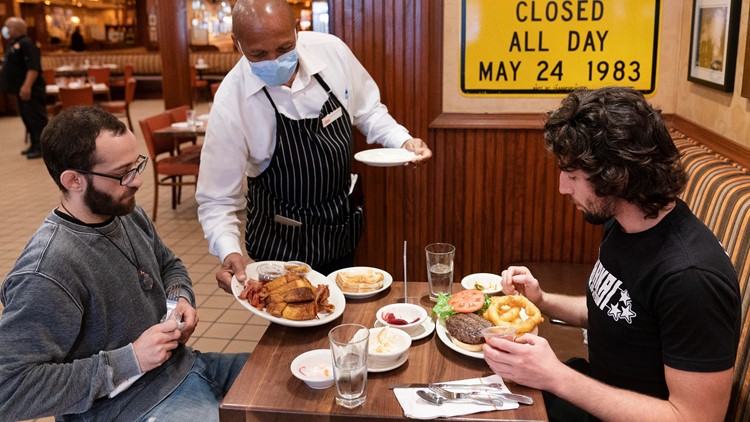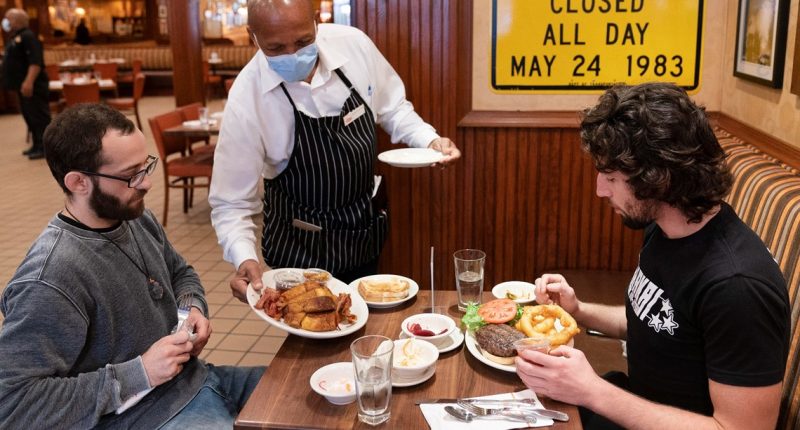Share this @internewscast.com

In a surprise move, the Senate voted this week to unanimously approve the idea.
NEW YORK — President Donald Trump’s “no tax on tips” pledge became a catchphrase for his 2024 campaign. Now it’s inching closer to reality.
The concept is deeply embedded in the expansive tax reduction package that Republicans are currently finalizing in the House, with intentions to pass it shortly. In an unexpected turn, the Senate unanimously gave its approval to this idea earlier this week.
The proposal enjoys broad backing from the general public, politicians from both parties, and employers who are confident that this measure will provide respite to the working class. However, numerous detractors argue that it would impose a significant financial burden on the government while offering minimal assistance to the workers who are in dire need of it.
Here’s a look at the proposal and its potential impact:
What’s in the ‘No Tax on Tips’ provision?
This initiative would introduce a new tax deduction that exempts federal income taxes on tips for individuals employed in roles where tips are a customary part of compensation, provided their earnings are below $160,000 in 2025. The Trump administration is tasked with publishing a list of eligible occupations within 90 days following the bill’s enactment.
Only tips reported to the employer and noted on a worker’s W-2, their end-of-year tax summary, would qualify. Payroll taxes, which pay for Social Security and Medicare, would still be collected.
If adopted, the proposed deduction is set to expire after four years. Congressional budget analysts project the provision would increase the deficit by $40 billion through 2028. The Committee for a Responsible Federal Budget, an advocacy group, projects the cost would be $120 billion over a decade if the tip exemption is made permanent.
What did Trump say during the campaign about eliminating federal taxes on tips?
Trump made the promise during a campaign stop in Las Vegas, where the service sector drives the economy, as part of his pitch to working-class voters struggling with rising costs.
Segments of his base eagerly spread the word, writing the catchphrase on their restaurant receipts or talking to their barbers about it while getting a trim.
Trump offered few details at the time, but later made similar pledges to eliminate taxes on other forms of income, including overtime wages and Social Security payments. Those ideas, along with a tax deduction for auto loan interest, are also included in the GOP’s budget bill.
“No tax on tips” was later embraced — with limits — by the influential Culinary Union, which represents Las Vegas Strip hospitality workers, Nevada’s Democratic senators and Vice President Kamala Harris, Trump’s Democratic rival.
How could it impact workers?
Experts say some middle-income service workers would benefit from a tax break but warn that it could potentially heighten inequities.
“If your goal is to help the poorest service workers, this is probably not the way to do it,” said Michael Lynn, a professor of services marketing at Cornell University whose research largely focuses on tipping and other consumer behavior.
About a third of tipped workers make too little to owe income taxes. Those workers won’t benefit from the tax break, so its benefits will accrue to tipped workers with higher incomes, Lynn said.
“It’s overlooking non-tipped workers who need the help just as badly, and it’s giving the benefit predominantly to the least needy of the tipped workers,” Lynn said.
The median age for tipped workers is 31, a decade younger than the median non-tipped worker, and they tend to make lower wages, according to the Yale Budget Lab.
Among tipped workers who make enough to owe Uncle Sam, the average tax cut would be about $1,800, according to the Urban-Brookings Tax Policy Center.
The measure also would be complicated to enact.
What do employers say?
The National Restaurant Association is among industry groups that have been strong backers of a “No Tax on Tips” provision. When reached for comment Wednesday, a spokesperson pointed The Associated Press to a previous statement following the legislation’s introduction in January.
“Eliminating taxes on tips would put cash back in the pocket of a significant number of workers in the restaurant and food service industry and could help restaurant operators recruit industry workforce,” Sean Kennedy, executive vice president of public affairs for the association, said at the time — calling the No Tax on Tips Act “sensible legislation” that he said includes “fiscally responsible” protections.
And in Nevada, the Culinary Workers Union specifically credited the state’s two Democratic senators, Catherine Cortez Masto and Jacky Rosen, with working with Republicans to push the legislation forward — and called on the House to “get this done for working families.” The union represents about 60,000 casino and hotel workers across the state, including bartenders, food servers and cocktail servers who rely on tips.
But other groups representing workers shared criticism of the legislation.
One Fair Wage, an advocacy group made up of nearly 300,000 service workers and over 1,000 restaurant employers pushing to raise the minimum wage, said the measure would offer “moderate relief for some” but is part of a tax package that “just helps the richest while leaving the vast majority behind.”
“For all the bipartisan celebration … this bill is a distraction from the real fight,” Saru Jayaraman, president of One Fair Wage, stated — again stressing that it was time to raise the minimum wage. The nonprofit also calls for ending tip credits that allow lower base wages for tipped workers in many states.
Cooper reported from Phoenix. AP Writer Rio Yamat contributed to this report from Las Vegas.
Copyright 2025 Associated Press. All rights reserved. This material may not be published, broadcast, rewritten, or redistributed.

















